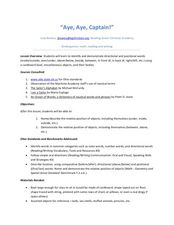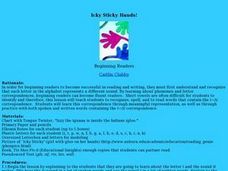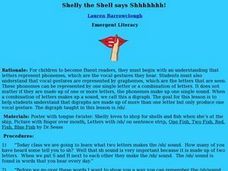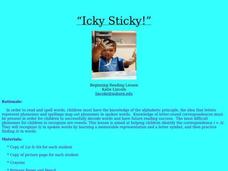Curated OER
Aye, Aye Captain
Students investigate how correspondences appear differently in different words. They also recognize the difference between long and short vowels. Students study how these correspondences are spelled and pronounced differently.
Curated OER
Shiny Shells on the Shore
Young scholars investigate how: A single phoneme, which is a vocal gesture in spoken words, can be represented by more than one grapheme. Also how a digraph is the combination of two letters that make one sound (there are both vowel and...
Curated OER
Oh Look, You're Fluent!
Students practice decoding unknown words and improving their fluency. They review using cover-up sticks to decode unknown words while reading. They practice sentences and a short story to increase their fluency. They work in pairs...
Curated OER
Shine Those Shades!
First graders observe as the /h/ sound is demonstrated and repeat it themselves. They practice saying a tongue twister using the /h/ sound stretching out the sound at the beginning of the words. They then take out primary paper and...
Curated OER
Sally Snake
Learners study the /s/ phoneme by examining the sound in written and spoken words. They recite a tongue twister, and examine how their mouths move as they make the sound. Next, they write the letter, differentiate the sound in given...
Curated OER
Adam's Apples
Young scholars examine the /a/ phoneme in both written and spoken words. They practice finding the /a/ in words, watch how their mouths move when making the sound, and write the letter. Next, they differentiate the sound in words, listen...
Curated OER
Alligator Open Wide
First graders recognize the short vowel a in written and spoken language. Through listening activities, they discriminate the vowel sound /a/ from other phonemes. Students associate the phoneme with its letter representation and identify...
Curated OER
Spotting Hidden Vowels
First graders recognize the short vowel i in written and spoken language. Through listening activities, they discriminate the vowel sound /i/ from other phonemes. Students associate the phoneme with its letter representation and identify...
Curated OER
Opera Singer
Students recognize the short vowel o in written and spoken language. Through listening and decoding activities, they discriminate the vowel sound /o/ from other phonemes. Students identify the phoneme and letter in pseudo words they read.
Curated OER
Allie The Alligator
Students recognize the short vowel a in written and spoken language. Through listening activities, they discriminate the vowel sound /a/ from other phonemes. Students associate the phoneme with its letter representation and identify them...
Curated OER
Icky Sticky
First graders the /i/ sound by practicing the way the mouth moves while making the sound while saying "icky, sticky." They write the letter "i" using both upper and lower case letters, make words using letterboxes, and write about a...
Curated OER
Icky Sticky Hands!
Students examine the letter 'i'. Through instruction and modeling they explore the sound the letter makes, how the letter is written, words that contain the letter, etc. They use letterboxes to write 'i' words and read stories containing...
Curated OER
Open Wide
Students recognize the short vowel o in written and spoken language. Through matching and listening activities, they discriminate the vowel sound /o/ from other phonemes. Students associate the phoneme with its letter representation in...
Curated OER
Shelly the Shell
First graders identify the digraph /sh/ in written and spoken language. Students practice the production of the /sh/ sound through word practice and stories. They identify the initial and final placement of the new digraph /sh/ using a...
Curated OER
Open Wide
First graders make the sound of /o/ relating it to the sound they make when the doctor asks them to open their mouth and say "ahhhh". They think of different words that contain the /o/ and identify it as it is used in a sentence and...
Curated OER
Open Wide and Say Ahh
Learners recognize the short vowel o in written and spoken language. Through matching and listening activities, they discriminate the vowel sound /o/ from other phonemes. Students identify the phoneme and letter in words and pictures.
Curated OER
Can You Open the Creaky Door?
Students recognize the short vowel e in written and spoken language. Through matching and listening activities, they discriminate the vowel sound /e/ from other phonemes. Students identify the phoneme and letter in words and pictures.
Curated OER
Icky Sticky
Students recognize the short vowel i in written and spoken language. Through matching and listening activities, they discriminate the vowel sound /i/ from other phonemes. Students identify the phoneme and letter in words and pictures.
Curated OER
Abigail Ant
Young scholars recognize the short vowel a in written and spoken language. Through matching and listening activities, they discriminate the vowel sound /a/ from other phonemes. Students identify the phoneme and letter in words and pictures.
Curated OER
Fish Wish
Students identify the digraph /sh/ in written and spoken language. After a reading of a decodable story containing the digraph, students practice identifying the initial and final placement of the new digraph /sh/ in words using a...
Curated OER
Open Wide at the Dentist, "Aaaahh"
Study the /o/ in both written and spoken words by reciting a tongue twister and making words using Elkonin letterboxes. Next, write a message about frogs using /o/ words. Finally, listen to a short book talk on "Doc in the Fog" before...
Curated OER
Fish Wish
Learners identify /sh/ sound when reading and writing words with the /sh/diagraph. They practice saying "Shhhh" and then read the tongue twister "She sells sea shells and fish by the sea shore." They complete a worksheet circling...
Curated OER
AAAAAAAAAAA! Stop Crying!
Students practice recognizing the phoneme /a/ in spoken words. They interact with the book, "A Cat's Nap," and a poster with Abby and Allen on it that are asking animals for apples, and cards with words on them like at, mad, went, bag,...
Curated OER
What's Behind the Creaky Door?
First graders are introduced to the concept that letters stand for the mouth moves that we make when sounds are made. They practice making the /e/ sound and compare it to the sound a creaky door makes and then try saying the tongue...
Other popular searches
- Long Vowels Phonics Lessons
- Phonics Lessons Schwa Sound
- Phonics Lessons Suffixs
- 4th Grade Phonics Lessons
- Phonics Lessons Grade 3
- Fourth Grade Phonics Lessons
- Decoding Phonics Lessons
- Elementary Phonics Lessons
- Phonics Lessons Consonant T
- Phonics Lessons Suffix's
- Esl Phonics Lessons
- Abc Phonics Lessons

























